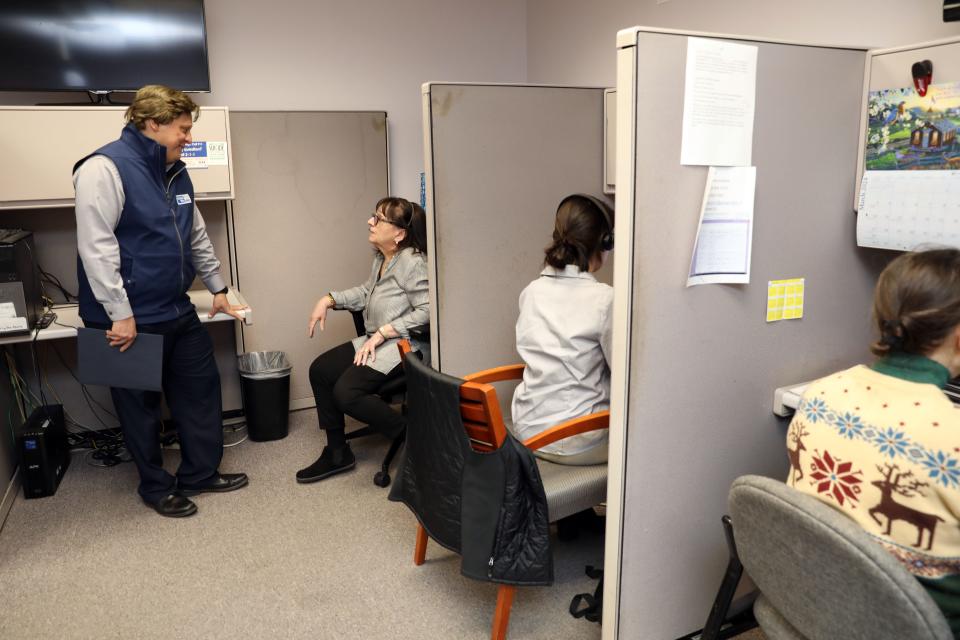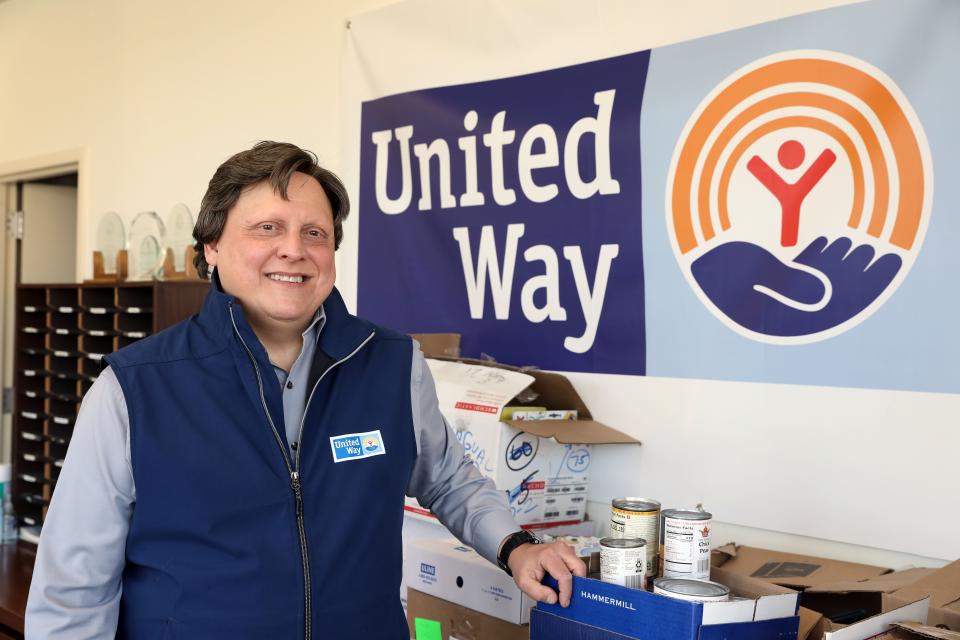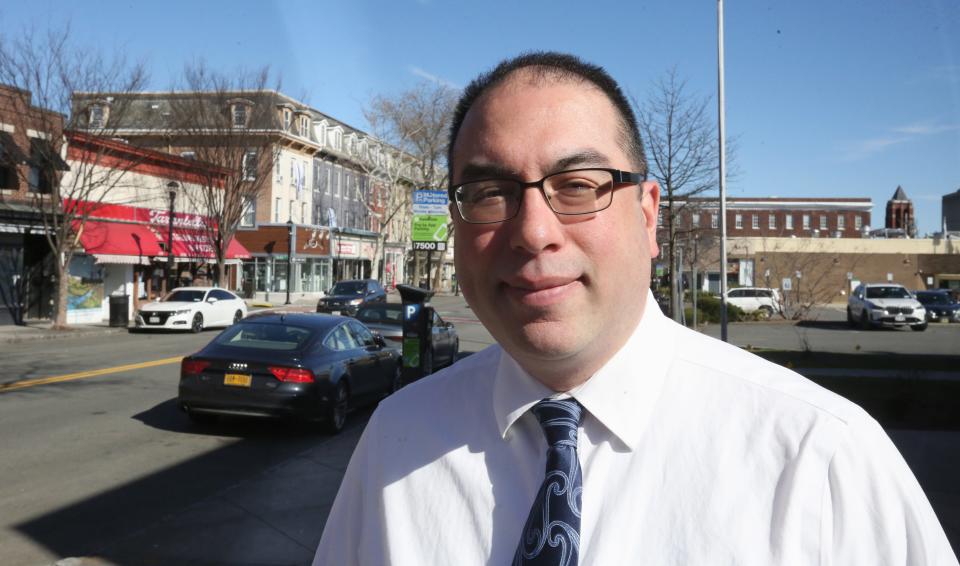How much does it cost a family to make it in Westchester, Rockland? You'll be surprised
Tom Gabriel knows how much a family of four would need just to squeak by in Westchester. The number is his go-to economic barometer.
The survival budget has room for rent and utilities, for child care and transportation, for health care and a cellphone, for food and taxes. There’s no room for extras. Not for savings. Not for college funds. Not for emergencies.
That family of four — two adults with an infant and a child in pre-K — would need to make $94,140 a year (or $47.07 an hour) to survive in Westchester County.
In Putnam County, the same family would need $101,652. (Or $50.83 an hour.)
In Rockland, they’d need $100,524. (Or $50.26 an hour.)
And those numbers are already out-of-date, failing to take into account the toll inflation has taken in recent years.

Meet ALICE
The number is called ALICE — short for Asset Limited, Income Constrained, Employed — and the United Way generates it in a report every two years, from thousands of data points in 28 states and the District of Columbia.
“The ALICE number measures the working poor. It's people who have jobs like waiters and waitresses, security guards, home health aides, preschool teachers, salespeople at big box stores,” said Gabriel, president and CEO of United Way of Westchester and Putnam.
ALICE is national but it’s also local. It uses standardized measurements to generate a specific snapshot of financial insecurity in the United States and in specific counties.
But here’s the thing: The latest report, issued last year, represents data from 2021, when the government was still propping up the COVID economy with all sorts of incentives: child tax credits, the Emergency Rental Assistance Program, the Excluded Worker Fund, enhanced unemployment.
“Those dollars are gone now,” Gabriel said. “We know based upon 2023 data, what it looks like — and it is stark right now.”
How stark?
If that Westchester family were able to scrape together their $94,140, Gabriel said, they’d be $22,380 short. The preliminary ALICE number for Westchester in 2023 — the data that will be analyzed and reported in 2025 — is $116,520.
Just to squeak by.
“Anybody who tells you this economy is humming is lying, or they've got their head in the stock market and they think that's the only indicator,” Gabriel said. “It is yet again, the wealthy, the upper middle class, they're doing well. Everybody else is getting squeezed.”
Poverty and ALICE
“Everybody else” includes two important segments: those who live below the federal government’s poverty line, making less than $26,500 a year, and those ALICE families who have jobs but live paycheck to paycheck in one of the nation's most expensive regions.
In 2021, the latest year for which there are full statistics:
Westchester had 371,736 households, of which 37,425 (or 10%) lived below the poverty line while 88,137 (or 23.7%) were ALICE families.
Putnam had 34,651 households, of which 1,836 (5.2%) lived below the poverty line and 9,538 (27.5%) were ALICE families.
Rockland had 102,609 households, of which 12,722 (12.3%) lived below the poverty line and 27,426 (26.7%) were ALICE families.
The poorest of the poor “are always affording themselves of the nonprofit community,” Gabriel said. “It’s the ALICE population that we really focus on because nobody takes care of them.”
A housing crunch
Consider, Gabriel said, the well-documented lack of affordable housing.
"For a family of four, we're looking at a minimum of almost $1,700 a month for housing costs, but, it's more likely $2,500 for basic housing. We're not talking about a house. We're talking about a rental unit somewhere. So you do $2,500 times 12 and that's $30,000 a year on housing alone."
Stephen Papas, president and CEO of United Way of Rockland County, where the ALICE number is higher than Westchester, said housing is a primary cause for anxiety among ALICE households, amounting to a quarter of the phone calls to his agency.
"Our housing rates are actually higher than their housing rates when you average it out across the entire county," he said. "That's really where it boils down that people are having the most difficult time in Rockland County, because for two adults and two children with childcare, it's $2,157 a month. If they're renting, that's the bare minimum that they're paying."
The housing costs are creating a pinch for non-profits, too, Papas said, with staffers unable to live in the county based on their state-set salaries.
"It's created a little bit of a housing crisis for them because they have people that are coming from the Bronx and from New Jersey to work there," he said. "And very few people are willing to travel that far to work there."
And United Way isn't the only agency relying on ALICE, Papas said.
"The Workforce Development Board utilizes these same numbers in Rockland County because they're trying to get the younger generation into employment," he said. "They look at these numbers because they have to also look at supportive services, not just, hey, we need to get people into jobs. It's what are their barriers in order to get a job? What supportive services would they need around in Rockland County to ensure that they are part of the workforce?"
Helping in-person workers
Gabriel's agency helps those ALICE families who run out of money before they run out of month.
"They're trying to make ends meet and they cannot, because what they make per hour versus what the costs are in Westchester, it's impossible," Gabriel said. "It doesn't add up."
ALICE may be a number — a vital number to gauge, in real terms, how much it really costs to live here — but the people Gabriel and his team serve are not numbers. They are seniors on fixed incomes. They are parents trying to figure out the child-care puzzle. They are children who are outgrowing their clothes.

ALICE families — those in hospitality and retail, construction and trade, health care, child care and education — don’t have the option of working from home, Gabriel said. When they're not in person, they don't get paid.
That reality, and a need for child care, led to a $6-million, multi-year state grant that helps the bottom line for 500 ALICE families in Westchester, Gabriel said.
The grant, which runs from July 2022 through June 2027, funds a bilingual after-school program for about 325 children in Ossining and Greenburgh and, pending state approval, another 175 children in Tarrytown come April.
The program is a win-win for these families. The after-school care is free, which means parents don't have to pay what normally would cost them $100 for child care. And they can stay on the job for three extra hours, where they might make $20 and hour.
"They make an extra 60 bucks a day," Gabriel said. "It's a game-changer for the 500 or so families that we're serving through this."
'There, but for the grace of God...'
Gabriel doesn't need the ALICE number to weathervane the economy. He has listened to the anxious voices of neighbors, at the end of their rope, who call the free 211 help line when they have nowhere else to turn. The line operates 24/7, through calls, text messages and email, too, in every community in the U.S., and in Canada.
The White Plains office fields calls from the entire Hudson Valley, Long Island and the Adirondacks.
"It could be: 'I just lost my job. How do I apply for unemployment insurance?' 'I'm being evicted. Where do I get rental assistance? How do I fight my eviction?' It could be: 'I am thinking about suicide.' We get crisis calls all the time. It could be 'I'm the victim of domestic violence. Where do I turn?'"
The need expressed on the 211 help line is heart-rending, Gabriel said.
"I listen to some of those calls and the stories are unreal and 98% of the time these are stories where you can say, 'There but for the grace of God, go I."
Last year, the 15 counselors made 680,000 referrals, a skyrocketing demand. Gabriel said in 2023:
Housing insecurity calls were up 20%, on top of a 20% increase in 2022;
Food insecurity calls were up 40%, on top of an 80% increase in 2022;
Child care calls rose 30% on top of a 30% increase in 2022; and
Calls regarding financial assistance with rent or utilities were up 20%, after a 115% increase in 2022.
The staggering increases in 2022 came "when the rug got pulled out," Gabriel said, meaning when emergency rental assistance disappeared, when the child tax credit disappeared, when all of those stimulus measures disappeared.
"When we took that away, we took away their floor. They fell through the floor," he said. "And again, we're not talking about people in poverty. We're talking about people who were working."

More than just one issue
A call that is made for one reason — a mother who has run out of baby formula — often reveals a host of other issues when handled by a trained professional. Each of those issues could result in a referral to a wide network of non-profits.
"You always have a secondary and a tertiary issue going on," Gabriel said. "They may be connected. When you finally call and say, 'I can't feed my family,' it's probably because you just lost your job. And the pride that you take in work is not something you're able to share with someone. So you call about the food insecurity and not about the job loss. That's why 211 exists."
The number of calls to 211, Gabriel said, "flies in the face of everything we're hearing that this economy is doing well."
"It's not. It's just not."
Is making ends meet a struggle for you?
If you're having trouble getting by in Westchester, Rockland or Putnam counties, we'd like to hear from you. How hard was it for you to find housing? Is your grocery bill unbelievable? How long did it take you to find child care you could afford? Share your story and you might be contacted for future stories about affordability — or unaffordability — in the northern suburbs.
Reach Peter D. Kramer at pkramer@gannett.com.
This article originally appeared on Rockland/Westchester Journal News: What's the cost of living for Westchester, Rockland NY? What you need

